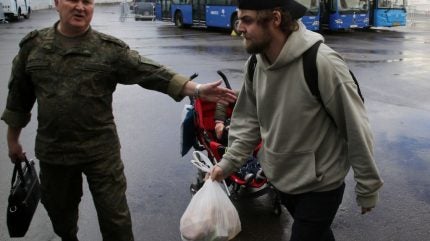
On 21 September, seven months into Russia’s invasion of Ukraine, President Vladimir Putin announced partial military conscription, leading thousands of Russians to flee the country as soon as possible.
For those who stay, however, the accompanying legislation mandates that all organisations, including international companies, conduct military registration of their staff (if at least one of the employees is eligible for military service). They must also assist with delivering the summons from the military to their employees, ensure the delivery of equipment to assembly points or military units, and provide buildings, communications, land plots, transport and other material means, as well as any relevant information.

Discover B2B Marketing That Performs
Combine business intelligence and editorial excellence to reach engaged professionals across 36 leading media platforms.
In short, international companies are now obliged to assist the Kremlin’s war mobilisation by helping conscript soldiers and equip the army. Foreign businesses in Russia employ some 700,000 people in the country, according to an analysis by B4Ukraine – a coalition of Ukrainian and international civil society organisations. As such, Business for Ukraine (B4Ukraine) is urging multinationals to leave Russia immediately to avoid becoming directly complicit in Russia’s atrocities in Ukraine.
Foreign companies in Russia have nowhere to hide
“Putin’s actions make the clearest demands on businesses to date: either support the conflict and be complicit in war crimes or leave Russia,” Tara Van Ho, co-director of the Essex Business & Human Rights Project at the University of Essex, told B4Ukraine.
“Normally, we shouldn’t see such a clear binary in a conflict situation: leaders should not require businesses to participate in war crimes, but that is what Putin is doing now. The impact is clear: foreign businesses need to cut their ties. This can result in significant losses for those businesses, but the alternative is worse. This should also send a clear signal to businesses that they need a better plan of action for how they disengage from situations of conflict and authoritarianism.”
The legislation applies to all the companies that are currently operating on a full or limited scale in Russia, of which there are some 1,600. According to the Kyiv School of Economics, 87% of people employed by multinationals in Russia work for companies from ten countries: China, France, Germany, Greece, Italy, Japan, the Netherlands, Switzerland, the UK and the US. In particular, US companies employ 251,294 people in Russia, French companies employ 123,642 people and German companies employ 91,280 people.

US Tariffs are shifting - will you react or anticipate?
Don’t let policy changes catch you off guard. Stay proactive with real-time data and expert analysis.
By GlobalData“So far, most of the multinationals operating in Russia have been indirectly involved in the war by paying taxes to the Russian state, contributing to the war economy,” Nataliia Popovych, founder of WeAreUkraine, told B4Ukraine.
“Now the Kremlin’s mobilisation makes companies directly involved in conscripting the soldiers among their employees who will come to Ukraine to kill and occupy. It gives carte blanche to Russia’s authorities to pull resources from companies. This is a red flag for companies who have chosen to remain in Russia. Your risk of complicity in Russia’s war crimes in Ukraine is now very real.”





